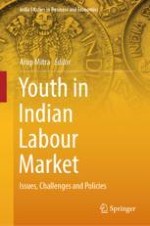2024 | OriginalPaper | Buchkapitel
Education and Labour Policy Agendas, Escalating Informality and Social Vulnerability: Mapping Domain and Historical Continuities Within Development Agendas
verfasst von : Veena Naregal
Erschienen in: Youth in Indian Labour Market
Verlag: Springer Nature Singapore
Aktivieren Sie unsere intelligente Suche, um passende Fachinhalte oder Patente zu finden.
Wählen Sie Textabschnitte aus um mit Künstlicher Intelligenz passenden Patente zu finden. powered by
Markieren Sie Textabschnitte, um KI-gestützt weitere passende Inhalte zu finden. powered by
